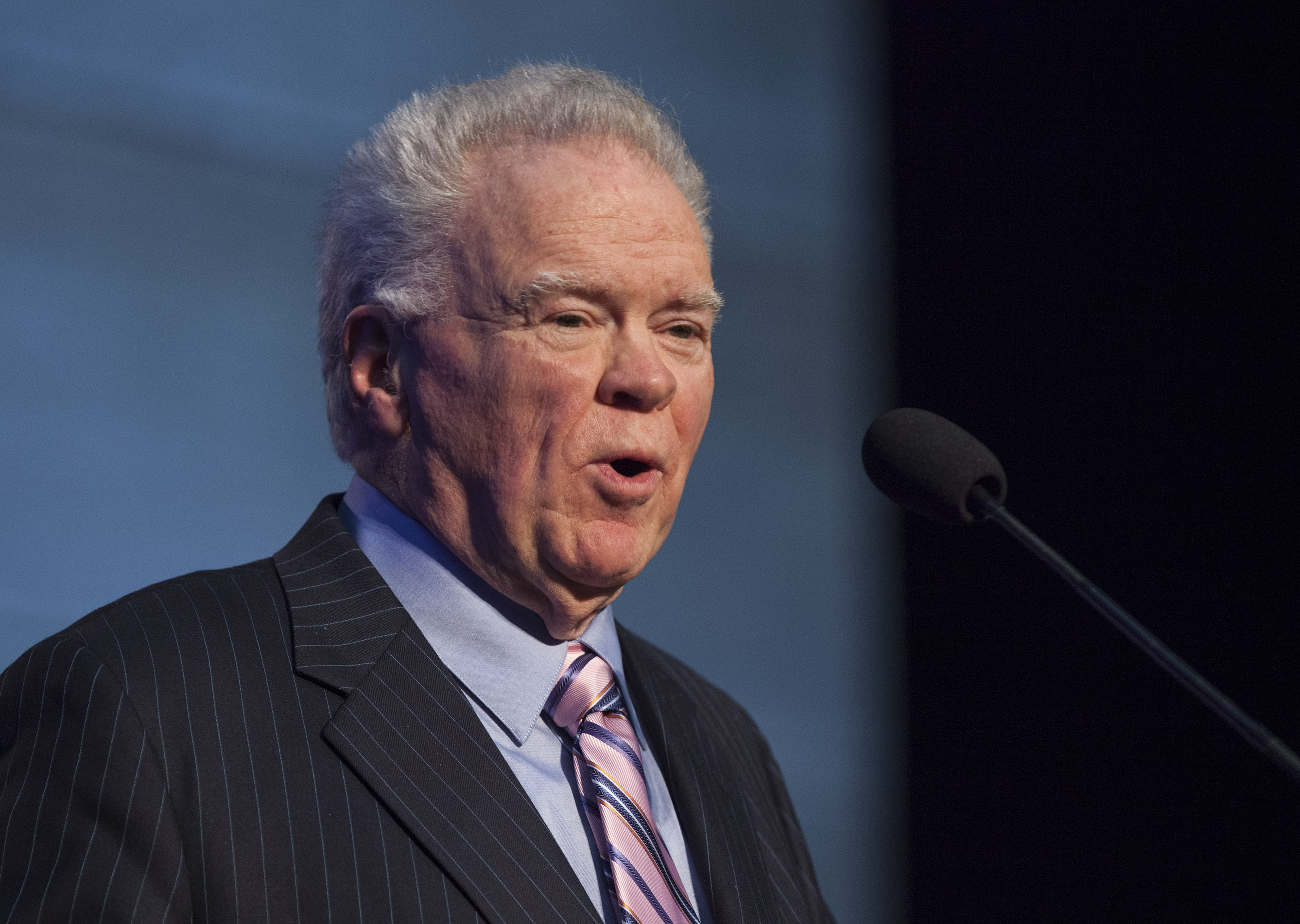
[SLIDESHOW=47866]FORT WORTH, Texas (BP) — Amid ongoing discussion of statements by Southwestern Baptist Theological Seminary President Paige Patterson on domestic violence, Patterson and the executive committee of the seminary trustees have issued a statement affirming “the importance of protecting victims of abuse.”
Meanwhile, at least five Southern Baptist Convention entity presidents have made statements on domestic violence since April 29. Three referenced Patterson by name but did not offer an opinion specifically on his comments. The others commented on domestic violence generally without naming Patterson.
 At issue is a 2000 audio clip circulating online in which Patterson said the proper response of a wife to domestic abuse “depends on the level of abuse to some degree.” Patterson issued a statement April 30 clarifying his view on domestic violence and voicing regret “that the way I expressed that conviction has brought hurt.” He further clarified his views in an April 30 interview with Baptist Press.
At issue is a 2000 audio clip circulating online in which Patterson said the proper response of a wife to domestic abuse “depends on the level of abuse to some degree.” Patterson issued a statement April 30 clarifying his view on domestic violence and voicing regret “that the way I expressed that conviction has brought hurt.” He further clarified his views in an April 30 interview with Baptist Press.
A May 2 Washington Post article said the “backlash” to Patterson’s comments “has some wondering” whether he “will resign from his presidency” at Southwestern and whether he will give the convention sermon at next month’s SBC annual meeting in Dallas. Messengers elected Patterson as the 2018 convention preacher at last year’s SBC annual meeting in Phoenix.
Patterson could voluntarily withdraw from delivering the convention sermon. If he does not and messengers wish to remove him, they could vote to withdraw their preaching invitation when the annual meeting agenda is adopted in Dallas, SBC Executive Committee spokesman Roger S. Oldham confirmed to The Post.
Neither Patterson nor SWBTS trustee chair Kevin Ueckert was able to respond to BP’s request for comment before its publication deadline.
The statement by Patterson and the trustee executive committee noted, “When Southwestern Baptist Theological Seminary comes to the topic of abuse, above all other emotions we feel compassion, concern and a commitment to protect women, children, and others whose lives of promise and potential have been altered in tragic ways by the sin and violence of abuse. These are people whom God has made in his image.”
The statement (printed in full at the end of this story) included three main affirmations:
— It affirmed “that law enforcement officials and civil authorities have a vital and God-ordained role in addressing abusive relationships.”
— It affirmed “the importance of protecting victims of abuse.” In conjunction with that affirmation, Patterson and the trustee executive committee endorsed a March 2018 “statement on abuse” by the Council on Biblical Manhood and Womanhood (CBMW).
“We affirm that statement in its entirety,” Patterson and the trustee leaders noted, “and draw particular attention to the affirmation that ‘the local church and Christian ministries have a responsibility to establish safe environments; to execute policies and practices that protect against any form of abuse; to confront abusers and to protect the abused, which includes the responsibility to report abuse to the civil authorities.'”
— It affirmed “that the gospel of Jesus Christ has led us to believe that there is no person in this world who is beyond redemption.”
The statement did not reference Patterson or the discussion of his comments.
Entity presidents weigh in
Four SBC entity presidents have tweeted about domestic abuse, and another gave a statement to The Post.
R. Albert Mohler Jr., president of Southern Baptist Theological Seminary, told The Post, “I stand behind the CBMW statement on abuse and I am sure that the Southern Baptist Convention would also stand behind that statement. I am also certain that Southern Baptists at the convention in June will and must speak clearly and take an unequivocal stand against any abuse of women.”
Thom Rainer, president of LifeWay Christian Resources, tweeted April 30, “The ongoing discussion over recent comments by fellow Southern Baptist Paige Patterson remind me we live in a politically charged environment, both in our nation and in our convention. Any statement is almost immediately construed to be a statement of political posturing. Such is neither my intent nor my desire.
“However, I cannot be silent on the issue of abuse of women. My silence becomes a reverberating echo of indifference at best. There is no level or type of abuse of women that is acceptable. We have been called by God to show honor and respect to all women and girls. They are our mothers, our sisters, our daughters, our granddaughters, and our wives. We thank God for them. And I stand with all who say ‘no’ to any type of abuse of women at any time and under any circumstance,” Rainer said.
President Russell Moore of the Ethics & Religious Liberty Commission and President Kevin Ezell of the North American Mission Board both affirmed Rainer’s statement via Twitter May 1.
Moore added in a series of tweets, “Marriage as a picture of the Christ/church mystery (Eph. 5:32) means that spousal abuse is not only cruel and unlawful, but is all that and also blasphemous against a Christ who loves and sacrificed himself for his Bride.
“A woman being abused should leave the house and call the police. The state should prosecute the abuser and the church should discipline him,” Moore tweeted.
Moore added, “The Bible teaches, in my view, that divorce is ethical in cases of sexual immorality (Matt. 5:32) or abandonment (1 Cor. 7:25). Abuse makes a home unsafe and constitutes abandonment.”
Daniel Akin, president of Southeastern Baptist Theological Seminary, tweeted May 1, “Any physical abuse on any level is completely unacceptable in a marriage. The church should immediately step in & provide a safe place for the abused. This has been my consistent counsel my entire ministry. Any counsel to the contrary is unwise & even dangerous.”
Akin also retweeted the CBMW statement and a statement by Southeastern Provost Bruce Ashford that “a physically abused woman should separate from her husband and have him put in jail.”
**********
Statement on abuse by Paige Patterson and the executive committee of the Southwestern Seminary trustees:
When Southwestern Baptist Theological Seminary comes to the topic of abuse, above all other emotions we feel compassion, concern and a commitment to protect women, children, and others whose lives of promise and potential have been altered in tragic ways by the sin and violence of abuse. These are people whom God has made in his image.
Southwestern Seminary takes the Bible as its guide in all matters of faith and ethics. The Baptist Faith & Message is the instrument of our doctrinal accountability to the churches of the Southern Baptist Convention.
First, we want to affirm that law enforcement officials and civil authorities have a vital and God-ordained role in addressing abusive relationships. Article XVII of The Baptist Faith & Message states that “Civil government being ordained of God, it is the duty of Christians to render loyal obedience thereto in all things not contrary to the revealed will of God.” The wording of The Baptist Faith & Message draws substantially from the declaration in Romans 13:4 that “[Government] is God’s servant for your good. But if you do wrong, be afraid, because it does not carry the sword for no reason. For it is God’s servant, an avenger that brings wrath on the one who does wrong.”
Second, we want to affirm the importance of protecting the victims of abuse. Because of the clarity of the Council on Biblical Manhood and Womanhood’s Statement on Abuse, we affirm that statement in its entirety and draw particular attention to the affirmation that “the local church and Christian ministries have a responsibility to establish safe environments; to execute policies and practices that protect against any form of abuse; to confront abusers and to protect the abused, which includes the responsibility to report abuse to the civil authorities.” The statement echoes Southwestern Seminary’s mission to send out into the world ministers of the gospel who are committed to protect and counsel women, children, and other victims of physical abuse; who will offer them strong encouragement and support to seek safety away from abusive environments; and who will seek to “provide ongoing counseling and support for the abused.”
Third, we want to affirm that the gospel of Jesus Christ has led us to believe that there is no person in this world who is beyond redemption. Alongside every church’s responsibility to report abusers to civil authorities stands the church’s responsibility to seek that the abuser confess to, denounce, and repent of the sin of abuse, accepting responsibility for those sinful actions, and trusting in Christ for salvation and forgiveness from sin.
















